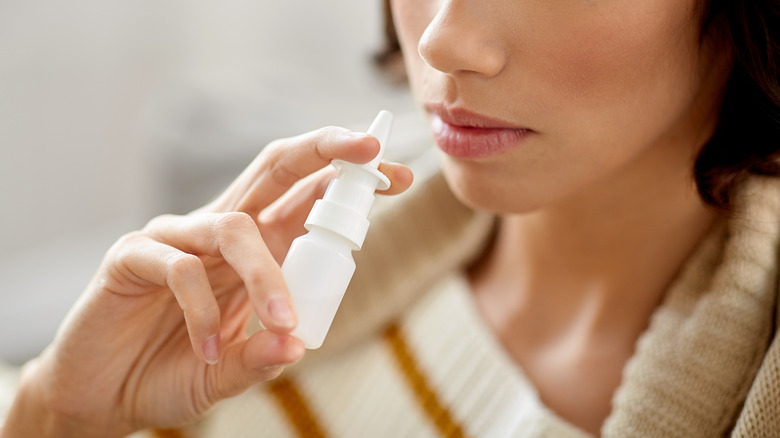
Nasal sprays are a widely used medication type that comes in liquid form and is administered into the nose to relieve congestion. According to the Family Doctor, congestion can result from allergies or a cold, leading many to use nasal sprays to ease sinus stuffiness. These sprays are accessible over-the-counter or by prescription in two forms: a pump spray or a pressurized can. Both types operate similarly in the body, but a pump spray involves squeezing a pump while the other requires pressing down on a canister.
There are various nasal spray types, with some intended for short-term use and others suitable for prolonged periods. The American Academy of Otolaryngic Allergy notes that allergy nasal sprays are typically available as antihistamines, steroids, and decongestants. Antihistamine is a familiar term as it’s a common component in oral allergy medications, but it is also available in nasal spray form.
For long-term use, doctors often prescribe steroid nasal sprays, which can be used for extended durations and provide relief from multiple allergy symptoms, including inflammation and nasal congestion, according to the American Academy of Otolaryngic Allergy. Decongestants work similarly to steroid nasal sprays but are designed for short-term use. Other nasal sprays, like saline sprays, are available, but they primarily aim to keep the nose moist and do not target allergy symptoms.
When to throw out nasal sprays

Like other liquid medications, nasal sprays have an expiration date that should be adhered to. Insider explains that preservatives in nasal sprays help maintain the liquid’s safety for a considerable time. However, the effectiveness of these preservatives diminishes over time, rendering the spray ineffective and potentially causing illness.
Using a nasal spray past its expiration date could mean using a contaminated product, as noted by Verywell Health. The longer a nasal spray is kept, the more opportunity exists for dirt and bacteria to accumulate and contaminate it.
Once expired, it’s advisable to discard your nasal spray to prevent any adverse health effects. WebMD suggests alternative remedies for alleviating allergy symptoms if you prefer not to use expired nasal sprays, such as nasal washes and protective measures. If you anticipate exposure to dirt and pollen, wearing a mask and sunglasses can help keep debris out of your mouth, nose, and eyes. Meanwhile, cleansing your nose with saline spray can aid in clearing out allergens.




